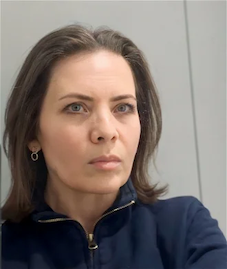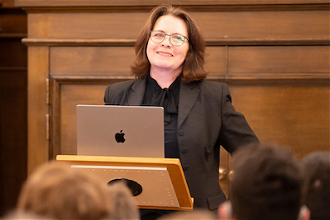Our calling in dark times

Jenny Sinclair is Founder and Director of Together for the Common Good. This is an edited version of her talk, 'The Relational Church: Our Calling in Dark Times' given at Hinsley Hall, Leeds, on 1 December 2023. Jenny was guest speaker for the Northern Diaconate Formation Partnership's training weekend.
The Catholic tradition is quite explicit that the Church's relationship with the poor is central. The poor and excluded are supposed to be at the heart of the Church. This is very challenging for Churches that have become middle class.
'Walking together' - this phrase that we're using now - with poor people, does not mean just serving their needs. Many Churches fall into the trap of welfarism - that is, a defeatist politics that sees increasing social security benefits as the primary way to help poor people.
How different is this from the way of communion, where we enter into a relationship of solidarity which then naturally and organically advocates for jobs and investment to enable everyone to reach their aspirations. A relationship with people who are low paid means mutual respect and respecting their agency. There's a reciprocity though, that means hearing each other's stories, spending time together. Not a service-client relationship.
Catholic Social Teaching helps us stay true to mission.
About eight years ago you might remember Pope Francis said, "We are living not through an era of change, but a change of era." We've got to take that seriously. He wasn't the only one to spot this. To understand why becoming relational is important, we need to understand this new era.
In many cases people need to be reconverted or even introduced to our own tradition of Catholic social teaching. It's often said to be the best kept secret but it's really unforgivable now. It's a worldview. It's a fantastic framework for good judgement.
So Catholic Social Teaching - which has been called the theology of the Holy Spirit in practice - can help us recognise what's going on. It helps us understand these matters of political economy - that means, how our society is structured in terms of how power is arranged, our arrangements in terms of jobs, investments and so on. It helps us to understand and identify the social and cultural systems that are dehumanising. It's always concerned about the human person. It gives us an authentically Christian and Catholic political literacy, It helps us avoid mission drift, which is a massive risk just now and resist the corrosive influences of all kinds of secular ideologies which are becoming so active in this era.
These ideologies are dangerous for Christians. Secular humanism laughs at God. It reduces religion to a lifestyle choice, it aims to relegate the Church to a private club out of the public square. And this post-modernist ideology wants us to adopt false ideas about human beings. And some well-intentioned people - sadly in the Church - have been seduced into these worldviews. But we should be confident in our Christian identity. We need to remember we are made in the image of God: and as Christians our identity is in Jesus Christ.
So back in 1891, when Catholic Social Teaching - the modern version of it - started, it was mounting a response to the Industrial Revolution, noticing what was happening to human beings. It emerged from a Church that was standing in solidarity with the poor at that time. An authentic, reciprocal relationship with poor people helps us to discern the signs of the times. We're not in relationship with poor people, so we tend not to be able to read the signs of the times properly.
It has then continued to guide us all these years with encyclicals, letters and guidance - to uphold true freedom, to uphold the human spirit - to resist what we might call 'the principalities and powers'.
So Catholic Social Teaching, identifies, in simple terms, three types of power, the two earthly powers of money and state and the one transcendent power of human beings in relationship with each other and with God. Because we're made in the image of God, we are partly transcendent, and that means relational power is a transcendent power.
Correctly understood, Catholic Social Teaching transcends left and right. It's non-partisan, it's not anti- capitalist, because it recognises that capital can be creative, but it recognises that it has exploitative, extractive and commodifying tendencies and so it has to be constrained.
But neither is Catholic Social Teaching pro- or anti-state. It recognises that governments can and do promote the good, and it also calls out bureaucratic systems in the administrative state when they become dehumanising, too technocratic, too centralised. It's always concerned about the human person.
So, it calls for both state and money power to be de-centralised, distributed wherever possible to local institutions and to the family which it regards as the building block of society.
The Catholic Social Teaching lens can help us navigate this change of era
See Jenny Sinclair's full talk: https://togetherforthecommongood.co.uk/from-jenny-sinclair/the-relational-church


















